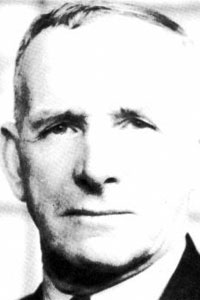Allen McCoag McCallister, one of the most colourful and successful Manitoba settlers, was the eldest son of George and Sarah (Watt) McCallister, pioneer immigrants from Glasgow, Scotland. Allen was born in the Township of Keppel, Grey North County, Ontario.
He was 18, when he came west to Manitoba. He worked on a farm, and later as a fireman on the Grand Trunk Railway. He bought and successfully operated a dairy in Prairie Grove. In 1913, he sold it, and purchased a half section of land six miles north of Portage. This farm enabled him to put into practice those ideas that set his place apart as a “demonstration” farm.
At first he ran a mixed farm, but in 1924, he started a new venture, that of growing peas as a feed crop. Not only did the peas benefit the soil, but they became popular as a food. This venture led to the building of an elevator on the farm, and later to the building of the McCallister Pea and Seed Cleaning Plant in Portage. The business of: cleaning, grading, bagging, and shipping peas to all parts of the world, plus the addition of other crop seeds like flax and clover, led the plant to hire more employees. Allen grew and sold registered grain, and sugar beets. With the introduction of irrigation provided by a P.F.R.A. dugout, fruit and vegetables were added to the gardens. They were grown and marketed successfully.
Community service was a high priority for Mr. McCallister. He was a charter member of the Portage Credit Union, president of the local Manitoba Federation of Agriculture, and the president of the Manitoba Co-operative Livestock Association. He served as a director of the Portage Co-op, and the Manitoba Pool Elevator. The advisory committee of the Dominion Seeds Branch was also helped by his wealth of knowledge. He served as councilor of the rural municipality from 1932-40, and was elected Reeve from 1940-49.
One of the accomplishments for which he was justly proud was the building of a senior citizen’s home in Portage. Allen was pleased that it was completely free of all debt. He did not believe in debts. Social assistance was unheard of at that time. He helped develop a program whereby needy families could cut and sell wood from municipal lands. His philosophy was that every able bodied man should work and take pride in his accomplishments.
He appreciated his natural environment. He practised conservation by: following crop rotation plans, building shelter belts, and controlling wind and water erosion sites. In 1944 he won the Kiwanis Victory Farm Award.
Mr. McCallister’s humble beginnings, made him realize that changes were necessary. When he saw that changes were needed, he took the necessary actions to correct the situation. His hard work, and thoughtful efforts on behalf of others, was, and is, and admirable legacy, that will not soon be forgotten.


